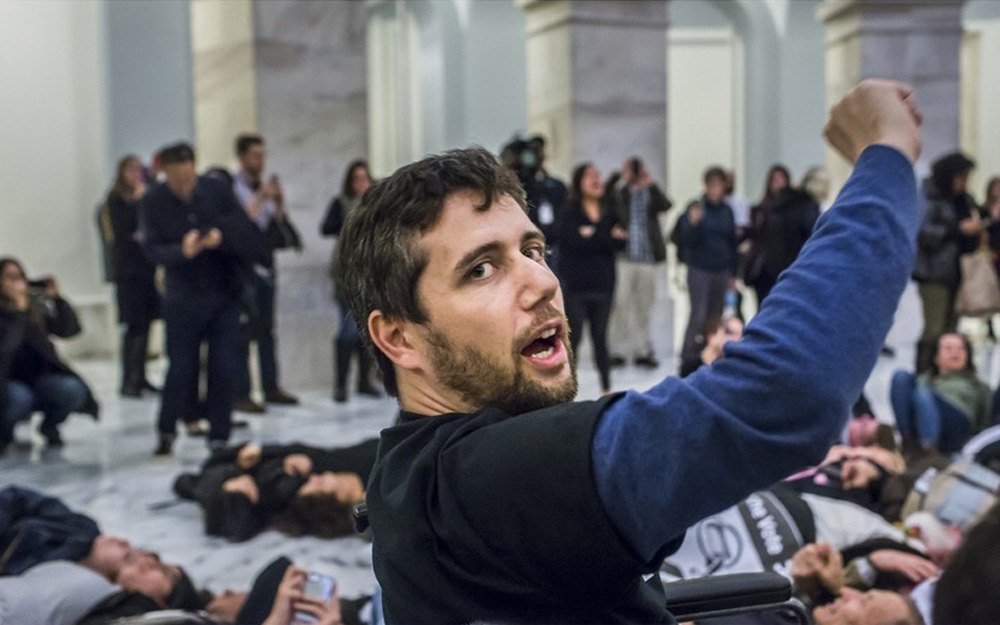“I really want to make the best of what I have left,” Ady Barkan confides to a bedside camera in “Not Going Quietly,” having learned just after he and his wife Rachael celebrated their 11th anniversary that he had developed ALS, which may not be the immediate death sentence it once was — it varies from person to person – but he could expect to lose his motor skills and his voice, just after his son Carl was born. Anyone on Twitter or into politics likely knows already that this was only the beginning for Barkan, who took a background in progressive activism to a whole other level in putting himself forward as a poster boy for the need for Medicare 4 All legislation, but as he became a more public figure, director Nicholas Bruckmann reveals that in fact there is much more to his story, his wits undiminished as he engineers a whistlestop tour that helped flip the House of Representatives in the 2018 midterms, yet facing the cruel reality that as Carl starts learning to walk and talk, he is regressing rapidly in both areas.
Although Barkan is the real deal, as self-deprecating and passionate as his online persona would suggest, Bruckmann pulls back the curtain slightly to show how he became a viral sensation with the help of Liz Jaff, a progressive strategist he met at Dulles International Airport after attempting to meet with congresspeople about their vote on health care. Prevented from meeting with then-Senator Jeff Flake of Arizona by his aides at his office, Jaff noticed that they were on the same flight home and turned on her camera as Barkan took the initiative to confront him, a decision that netted Barkan thousands of new followers on Twitter and provided a template for an effective and ongoing social media campaign. While people no doubt responded to what appeared as an authentic exchange with Flake unguarded in his comments, it’s fascinating to recognize that it was staged to a degree, something that is expanded upon when Bruckmann shows Barkan running a practice session for other health care activists showing them how to hound their local representatives and how to stand strong in town hall environments when others try to shut them down.
Barkan may be seen gradually losing his physical faculties as he embarks on a mission to visit 30 congressional districts with representatives expected to vote against health care legislation, but he shrewdly realizes the performative aspect necessary for activism to be effective in the social media era where shame and conflict are rewarded with engagement and as he goes from one city to the next meeting with those often dealing with a debilitating ailment like himself and feel disenfranchised, he comes across almost as if he’s some kind of oracle with the unique formula to cut through the noise. It’s smart of Bruckmann to often leave in seemingly innocuous observations of people attempting to prevent Barkan or those he’s empowered to confront their local representative from coming into their offices, even when it’s public property, and it’s not to put a fine point on what they represent, but to show what Barkan does as someone who isn’t supposed to know he’s permitted in those spaces and asserts his rightful place.
“Not Going Quietly” actually disabuses one of calling it “inspirational,” as Jake, a fellow ALS patient Barkan meets along the trail notes “it’s super-patronizing,” and while it profiles a man of extraordinary will, the film is moving because it shows him putting his own considerable achievements within reach for others so long as they’re willing to engage, making the case that there’s no excuse not to when even selfishly everyone is touched by health issues either personally or within their extended family. Like his foray into social media, Barkan makes an example of himself as a means to an end in granting access to his life, one in which his support system is prominently – and admirably – featured to show that he hardly does it alone, nor does he believe anyone else should.
“Not Going Quietly” will screen at SXSW through March 20th.




